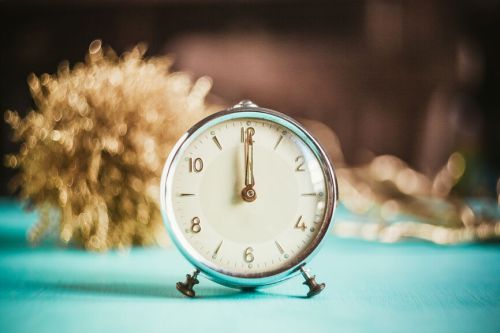Our editors independently select these products. Making a purchase through our links may earn Well+Good a commission
Sleep experts want you to use a bedtime alarm—here’s why
Just like you stretch before exercising, sleep experts say you need to prepare your mind and body for rest. Here's why they want you to try a bedtime alarm.

Many swear that committing to their healthy and highly personalized morning routine is what sets themselves up for a successful day. Whether that includes a satisfying stretch, a yoga flow, enjoying a hydrating and fiber-rich breakfast, or anything else, ritualizing the way you wake up can bridge the gap between restorative sleep time and productive wake time. And, according to experts, the same concept applies to the inverse situation of preparing the body to go to sleep.
The recommended amount of sleep for the average adult is seven to eight hours, yet many of us are not clocking our zzz’s for quite so long thanks to everything from anxiety to late-night boredom. In effect, this can preclude us from reaping restorative benefits of rest for both cognitive and physical function. “When we minimize that restoration process, we’re not going to awaken as refreshed or have processed what we needed to do in sleep that we can’t do when we’re awake,” says Nancy H. Rothstein, the sleep consultant behind The Sleep Ambassador. Her solution? A bedtime alarm.
Just as we prepare for our intense workouts by stretching, we need to prepare body and brain for sleep in order to reap the rejuvenating benefits—and, ideally, the routine starts an hour before you plan on going to bed. “We often treat sleep as an on-off switch and try to crash,” says licensed clinical psychologist and sleep expert Shelby Harris, PsyD, author of The Women’s Guide to Overcoming Insomnia. “But when we turn off screens and switch to more relaxing non-screen or non-electronic activities for the hour before bed, it helps the brain quiet down and fall asleep faster.” This, in turn, can lead to more regular sleep, because both bedtime and wake time are ritualized and habitual, she says.
“When we turn off screens and switch to more relaxing activities for the hour before bed, it helps the brain quiet down and fall asleep faster.” — sleep expert Shelby Harris, PsyD
Within that hour, you can do wind-down activities, like setting your morning alarm, brushing your teeth, and turning on the Do Not Disturb function on your digital devices. And just in case your morning snooze-button habit extends to your bedtime alarm as well, Dr. Harris recommends setting a “warning” alarm for about 15 to 20 minutes before bedtime.
Have extra time? Rothstein suggests taking a shower. “It cleanses you from your day. If you want to practice mindfulness without distraction, it’s in the shower: Close your eyes and feel the water on your body, and appreciate it.” There’s also some science to back up the warm-shower ritual‘s efficacy at helping to lull you to sleep. You know, in case you still aren’t sure whether you’re on Team Night Shower or Team Morning Shower.
Having trouble staying asleep? This customized pillow helped one editor fix her broken-sleep situation. And here’s why brown noise is what you should be listening to for A+ sleep.
Sign Up for Our Daily Newsletter
Get all the latest in wellness, trends, food, fitness, beauty, and more delivered right to your inbox.
Got it, you've been added to our email list.










